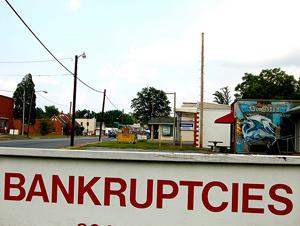Bankruptcy 101
(image: taberandrew/Flickr)
Chapter 7, Chapter 11, and Chapter 13 are all parts of one terrible book — it is called Bankruptcy. GM is struggling to avoid it, but what about the little guy, who is being crushed by personal debt? Personal bankruptcies are up by as much as one-third in 2008. Does the legal insulation meant to protect the American worker still function in this economic climate? Does filing for bankruptcy even make sense any more?
Bankruptcy laws have changed a great deal in the past few years, making it more difficult to qualify for certain chapters.
"If you file for Chapter 7, in particular, everything will be wiped away, your consumer debt will be wiped away. However, in most states its hard for people to qualify for Chapter 7, so, therefore, they go with Chapter 13, in which you are put on a three- to five-year payment plan," says Hall. "You still have to pay for your house, you still have to pay credit card debt, you have to pay student loans, you have to pay any back taxes, you have to pay store-card debt. It may be at a reduced level, but you have to pay this plan under Chapter 13," says Alvin Hall, a financial consultant and author.
Half of all bankruptcies in the United States have their roots in medical costs. The implications of this, according to Hall, are significant. "As people are getting laid off, they run through their COBRA period, most of them cannot find health insurance at a reasonable cost. All you need is one catastrophic illness…and it starts a snowball effect. The costs start to rise, and you can’t even afford to put food on the table."
Consumer debt in the form of credit cards has also contributed to the increase in bankruptcies. A "Bill of Rights" for credit card holders has once again been introduced in the U.S. Senate that would protect them from unscrupulous practices of changes in grace periods and interest rates. It has been tamped down in the past by an exceptionally powerful credit card lobby, but with more and more people being affected by job loss, the sour economy, and bankruptcy, it may stand a better chance of being signed into law.
In closing, Hall says, "People always talk about when the revolution comes, this may be the year that the revolution comes in credit cards."
Support PRI when you purchase Alvin Hall’s latest book, "Show Me The Money" .
"The Takeaway" is PRI’s new national morning news program, delivering the news and analysis you need to catch up, start your day, and prepare for what’s ahead. The show is a co-production of WNYC and PRI, in editorial collaboration with the BBC, The New York Times Radio, and WGBH.
More at thetakeaway.org
